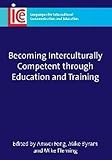Becoming Interculturally Competent through Education and Training / ed. by Anwei Feng, Michael Byram, Mike Fleming.
Material type: TextSeries: Languages for Intercultural Communication and EducationPublisher: Bristol ; Blue Ridge Summit : Multilingual Matters, [2009]Copyright date: ©2009Description: 1 online resource (192 p.)Content type:
TextSeries: Languages for Intercultural Communication and EducationPublisher: Bristol ; Blue Ridge Summit : Multilingual Matters, [2009]Copyright date: ©2009Description: 1 online resource (192 p.)Content type: - 9781847691637
- 9781847691644
- 370.117 404.2
- LC1099 .B44 2009
- online - DeGruyter
| Item type | Current library | Call number | URL | Status | Notes | Barcode | |
|---|---|---|---|---|---|---|---|
 eBook
eBook
|
Biblioteca "Angelicum" Pont. Univ. S.Tommaso d'Aquino Nuvola online | online - DeGruyter (Browse shelf(Opens below)) | Online access | Not for loan (Accesso limitato) | Accesso per gli utenti autorizzati / Access for authorized users | (dgr)9781847691644 |
Frontmatter -- Contents -- About the Authors -- Foreword -- Foreword -- Introduction -- Part 1: Investigations of Intercultural Encounters and Learning -- 1. Cultures of Organisations Meet Ethno-linguistic Cultures: Narratives in Job Interviews -- 2. Exporting the Multiple Market Experience and the SME Intercultural Paradigm -- 3. Evolving Intercultural Identity During Living and Studying Abroad: Five Mexican Women Graduate Students -- 4. Becoming Interculturally Competent in a Third Space -- Part 2: Refl ections on Teaching and Learning Programmes -- 5. A Critical Perspective on Teaching Intercultural Competence in a Management Department -- 6. Applying the Principles: Instruments for Intercultural Business Training -- 7. Intercultural Teacher: A Case Study of a Course -- 8. Using ‘Human Global Positioning System’ as a Navigation Tool to the Hidden Dimension of Culture -- 9. Professional Training: Creating Intercultural Space in Multi-ethnic Workplaces -- 10. The Pragmatics of Intercultural Competence in Education and Training: A Cross-national Experiment on ‘Diversity Management’ -- Afterword -- Index
restricted access online access with authorization star
http://purl.org/coar/access_right/c_16ec
The development of intercultural competence is the avowed purpose of teachers/trainers in commercial training and further and higher education, and yet the approaches are often seen as different and even in opposition. This book shows that there is complementarity in ‘education’ and ‘training’ in theory and in practice. The first group of chapters focuses on analysis of intercultural experience and the competence needed to be successful in that experience. The following chapters describe the practice of courses in both commercial and educational contexts where it becomes evident that ‘education’ and ‘training’ are indeed complementary without denying the tensions which exist and the expectations different learner groups may have. This book is thus not simply another discussion of the theory of interculturality but a juxtaposition of theory and practice to the benefit of both.
Mode of access: Internet via World Wide Web.
In English.
Description based on online resource; title from PDF title page (publisher's Web site, viewed 01. Dez 2022)


